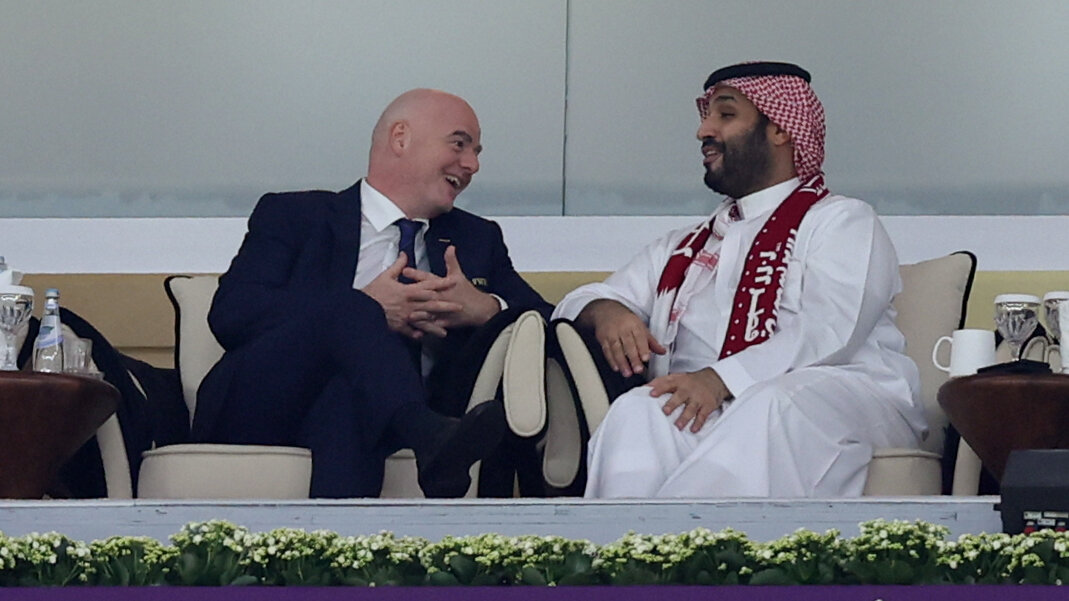FIFA President Gianni Infantino Defends Saudi Arabia’s 2034 World Cup Bid and Relationship with Donald Trump
In recent developments, FIFA President Gianni Infantino has addressed global concerns regarding the decision to award the 2034 World Cup to Saudi Arabia and his association with former U.S. President Donald Trump. Speaking at the International Football Association Board (IFAB) annual general meeting in Belfast, Infantino emphasized the significance of these relationships for the advancement of global football.
Awarding the 2034 World Cup to Saudi Arabia
The announcement of Saudi Arabia as the host nation for the 2034 FIFA World Cup has sparked widespread debate. Critics have raised issues pertaining to the country’s human rights record, treatment of migrant workers, and laws affecting the LGBTQ+ community. Despite these concerns, Infantino described the decision as a “very positive step for football,” highlighting its potential to unite the global community. He stated:
“There was a Congress decision, uniting the entire world. I think it was a very positive step for football, bringing, in eight years, football from all over the world, hosting everyone.”
Infantino further elaborated on FIFA’s strategy to globalize the sport, mentioning that after North America in 2026, South America, Africa, and Europe in 2030, it was Asia’s turn in 2034. He underscored the importance of inclusivity and bringing football to every corner of the world.
Financial Implications and Sponsorship Concerns
The decision to grant hosting rights to Saudi Arabia has also been scrutinized due to recent financial engagements between FIFA and Saudi entities. Notably, a sponsorship agreement with Aramco, the state-owned oil company, has raised questions about potential conflicts of interest and the influence of financial considerations on FIFA’s decisions. Critics argue that such partnerships could overshadow ethical concerns and the organization’s commitment to human rights.
In response to these allegations, Infantino maintained that the decision was made following an in-depth evaluation and was approved by the FIFA Congress. He emphasized that the move aligns with FIFA’s mission to promote football globally and is not solely driven by financial incentives.
Relationship with Donald Trump
Infantino’s association with former U.S. President Donald Trump has also come under the spotlight, especially in the context of the upcoming 2026 World Cup, which will be co-hosted by the United States, Canada, and Mexico. Infantino defended this relationship, asserting that collaboration with the host nation’s leadership is crucial for the successful execution of such a significant event. He remarked:
“I think it is absolutely crucial for the success of a World Cup to have a close relationship with the president. We are organizing a Club World Cup this year, the first ever FIFA Club World Cup, 32 teams, in the United States of America.”
Infantino also highlighted that during the bidding process for the 2026 World Cup, Trump was already in office, and maintaining a working relationship was essential for the tournament’s planning and execution.
Addressing Human Rights Concerns
The allocation of the World Cup to nations with contentious human rights records has been a recurring issue for FIFA. The 2022 World Cup in Qatar faced similar criticisms regarding the treatment of migrant workers and restrictions on personal freedoms. In Saudi Arabia’s case, organizations have expressed apprehensions about the country’s stance on freedom of expression, women’s rights, and LGBTQ+ rights.
Infantino acknowledged these concerns but reiterated FIFA’s stance on engagement and dialogue as tools for change. He expressed hope that hosting the World Cup would serve as a catalyst for positive developments within the host nation, fostering mutual understanding and progress. He stated:
“We have to be bringing everyone to the table. We will go to North America in 2026, now we go to South America, go to Africa, we’ll go to Europe in 2030. We’ll go back to Asia for 2034.”
Global Reactions and Future Outlook
The international community remains divided over FIFA’s decision. Supporters argue that bringing the World Cup to Saudi Arabia could encourage social and cultural reforms, leveraging the global spotlight to promote change. They believe that such events can serve as bridges between diverse cultures, fostering understanding and unity.
Conversely, critics contend that awarding the World Cup to countries with questionable human rights records undermines the values that FIFA purports to uphold. They argue that without concrete commitments to reform, such decisions could be perceived as endorsements of the status quo, potentially diminishing the organization’s credibility.
As FIFA moves forward with its plans, the global football community will be watching closely to see how these complex issues are navigated. The balance between promoting the sport worldwide and adhering to ethical standards remains a delicate endeavor, one that will undoubtedly shape the future of international football.
Do follow gulf magazine on Instagram
for more information click here


